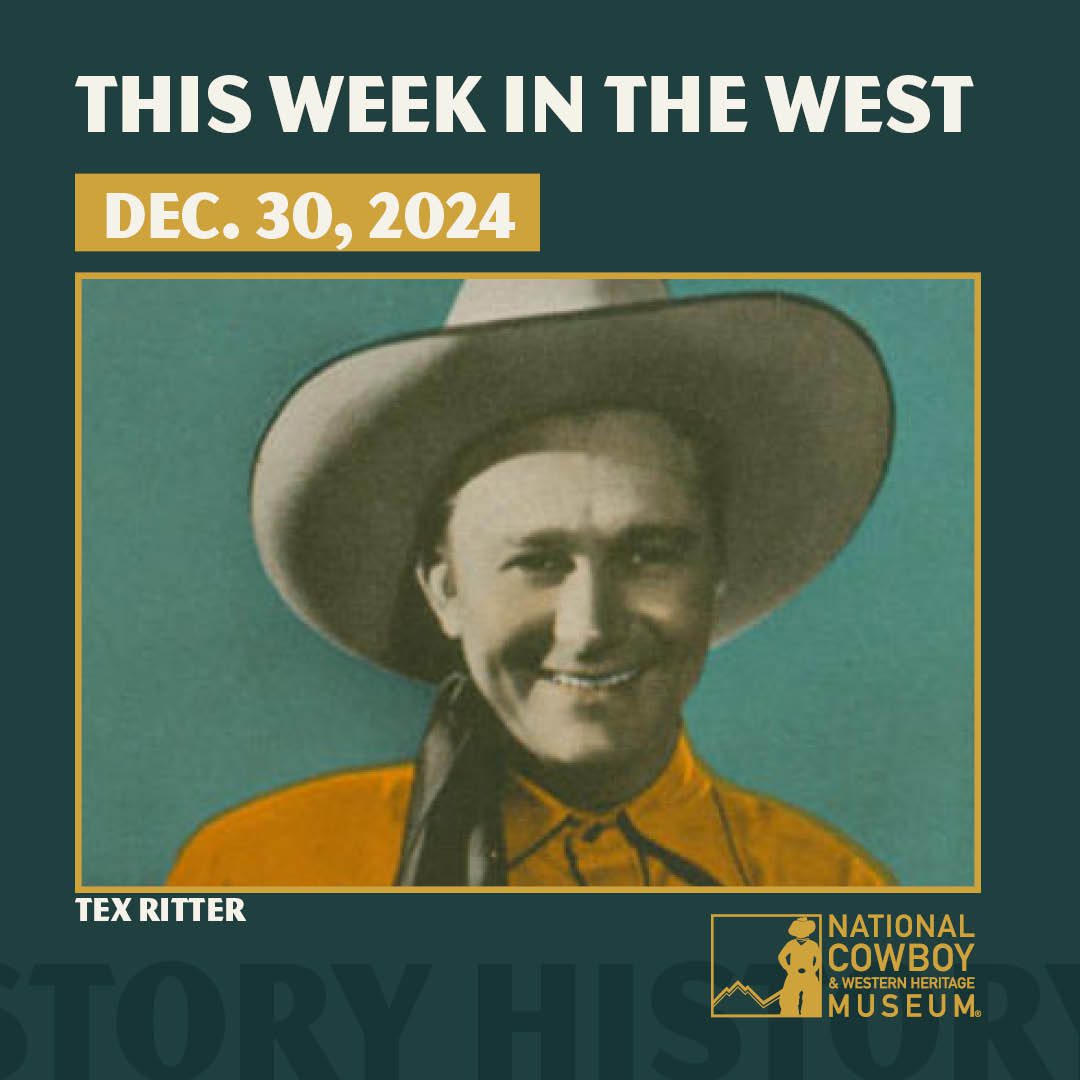Welcome to “This Week in the West.” Each week, we’ll share the show’s scripts here on our blog. Be sure to subscribe on your favorite podcast app or check back here every Monday.
If you have questions, ideas or feedback about the podcast, you can reach out to podcast@nationalcowboymuseum.org
Episode 9: Tex Ritter
Howdy folks, it’s the last week of December 2024 and welcome to This Week in The West.
I’m Seth Spillman, broadcasting from the National Cowboy & Western Heritage Museum in Oklahoma City.
On this podcast, we share stories of the people and events that shaped the history, art and culture of the American West—and those still shaping it today.
Woodward Ritter had gone to the University of Texas to study the law. Yet here was, in his fourth year of college and his grades were a disaster. Ten law classes. Five F’s, three D’s and two C’s.
All his time, including when he should have been studying, had been taken up by his time singing, crisscrossing the country as a performer and the president of the UT glee club.
The law would never enter the picture. Performing took Woodward on the road more and more. Eventually, he moved to New York City and landed a part on Broadway, where his distinct baritone voice and Western accent earned him a nickname that stuck.
Woodward “Tex” Ritter became one of America’s most beloved cowboys and country singers and went on to start a show business dynasty. He died this week, January 2, 1974.
Woodward Maurice Ritter was born January 12, 1905, in Murvaul, Texas and grew up on his family’s farm in Panola County. After going to college and his initial work on Broadway, Tex found himself in the early 1930s looking for his next break.
He’d heard about a show on Broadway getting ready to open with Western tunes. He auditioned, and his Western authenticity got him the role. He was part of the first Broadway performance of “Green Grow the Lilacs,” the show that would be retooled later into the classic musical “Oklahoma!”
After his success on the stage, Tex tapped into the increasing popularity of Western performers like Gene Autry. He made some recordings and was then hired to host the radio show “The Lone Star Rangers,” the first Western-oriented program broadcast in New York City.
He worked steadily, recording music, hosting multiple radio shows, and even returning to the stage occasionally. But in 1936, Hollywood beckoned, and Tex headed West.
Tex was again riding in Gene Autry’s wake as studios scrambled to get their own singing cowboys, including Grand National Pictures, a B movie outfit making as many movies as possible – fast and cheap.
Tex starred in “Song of the Gringo,” a 62-minute romp which earned him good reviews. One theater owner wrote to Grand National, “This young star is going places. Everybody likes him and wants to know when we are going to play the next picture. Give us more like these.”
Indeed, Tex did more. Like Autry and Roy Rogers, he became a big box office draw and made more than 70 movies. He’d change studios and start making better pictures, but he also became an even more popular singer.
Tex signed with the newly organized Capitol Records in 1942, becoming its first country artist. His song “I’m Wasting My Tears On You” became a crossover hit in 1944.
In 1945, he was voted one of the top ten Western movie stars and had the top three songs on the country music charts. Tex would go on to record with Capitol Records for 32 years.
A few years later, Tex received a frantic call from Dimitri Tiomkin, the musical director of a just-finished Western with Gary Cooper and Grace Kelly called “High Noon.” It had just had a test screening, and audiences had given it a collective shrug. It was not suspenseful enough, not dramatic enough and there was nothing tying it together.
Tiomkin had been ordered to compose a ballad that would run through the film. He wondered if Tex would sing it.
Tex agreed and recorded the song, “Do Not Forsake Me” for the film. Capitol had to be convinced to release it as a single. “High Noon” and “Do Not Forsake Me” were instant classics. The movie is considered one of the greatest Westerns ever made. The ballad would win an Oscar for Best Original Song, selling more than 800,000 copies.
By the 1950s, Tex expanded his career into television, “Town Hall Party” and “Ranch Party.” He became a founding member of the Country Music Association and, in 1964, was elected the fifth member of the CMA Hall of Fame. He is also a member of the Hall of Great Western Performers here at The Cowboy.
Ritter later moved to Nashville, joined the Grand Ole Opry, and even ran for the U.S. Senate.
Along the way, Tex started a family with his wife Dorothy Fay, an actress he met while filming Westerns and married in 1941. They had two sons, including John Ritter, an actor who would find fame starring in the sitcom “Three’s Company.” Tex’s grandsons, Jason Ritter and Tyler Ritter, also became actors.
Tex died of a heart attack in Nashville on January 2, 1974.
He was 68.
And with that, we’ve played our last note on this episode of “This Week in The West.”
Our show is produced by Chase Spivey and written by Mike Koehler
Follow us and rate us on Apple podcasts or wherever you hear us. That helps us reach more people.
We can follow us on social media and online at nationalcowboymuseum.org.
Got a question or a suggestion? Drop us an email at podcast@nationalcowboymuseum.org
We leave you today with the words of Frances Preston, Chairman of the Country Music Association Board of Directors, upon Tex Ritter’s induction into its Hall of Fame: “He is powerful yet gentle. He is commanding yet attentive. He is forceful yet compassionate. When you talk, he listens. When he talks, everybody listens. If personal problems are being discussed, they are never his. If there is an inconvenience, it is never his. But when you need him, he is always there.”
Much obliged for listening and remember, come Find Your West at the National Cowboy & Western Heritage Museum.



























